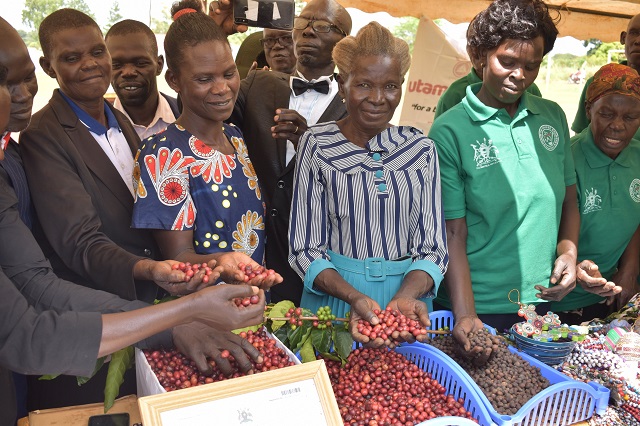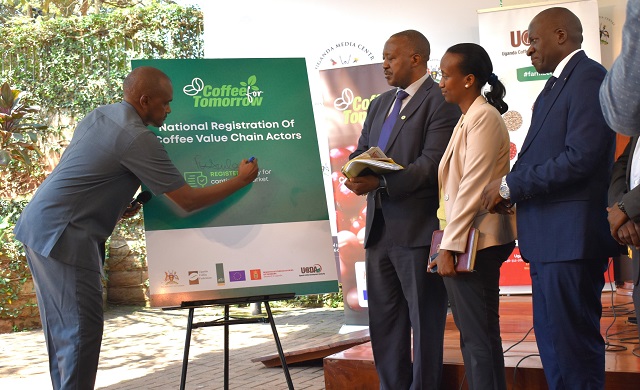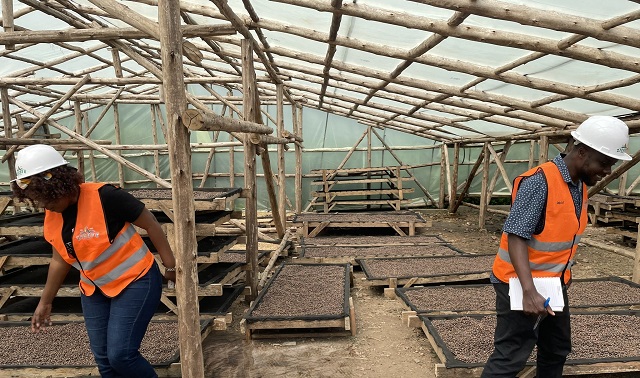
How EU agreed to delay deforestation-free coffee export directive to December 2025
COVER STORY | RONALD MUSOKE | Sustained pressure from both within the European Union and coffee-producing countries such as Uganda has compelled the EU to extend the implementation of its Deforestation Regulation directive by 12 months.
The ban is now set to take effect on Dec.30, 2025. In a statement issued on Oct.2, the European Commission said it was proposing a 12-month extension of “phasing-in period” to support the global implementation of the so-called EU Deforestation Regulation (EUDR).
The European Commission also published additional guidance documents to support third countries (non-EU member states) in their preparation for the implementation of the EU Deforestation Regulation.
“Given the EUDR’s novel character, the swift calendar, and the variety of international stakeholders involved, the Commission considers that a 12-month additional time to phase in the system is a balanced solution to support operators around the world in securing a smooth implementation from the start,” the EU Commission said.
“With this step, the Commission aims to provide certainty about the way forward and to ensure the success of the EUDR, which is paramount to address the EU’s contribution to the pressing global issue of deforestation.”
Should the proposal be approved by the European Parliament and Council, the law will come into force on 30 December 2025 for large companies and 30 June 2026 for micro-and-small enterprises.
The Commission said the 12-month extension is the only proposed change to the law and in no way puts into question the objectives or substance of the law, as agreed by the EU. The Commission noted that a large majority of countries around the world will be classified as “low-risk” after applying the benchmarking exercise. “This will give the opportunity to focus collective efforts where deforestation challenges are more acute.”
What’s the EUDR about?
The EU Deforestation Regulation which was passed by the European Parliament on Dec.05, 2022, is aimed at ensuring that the EU does not contribute to the escalating global deforestation challenge. It requires a set of commodities including; coffee, cocoa, soy, palm oil, wood, rubber, and cattle and their derived products are not sourced from deforested land as defined by the Food and Agriculture Organization of the United Nations (FAO). The EU Commission says “deforestation and forest degradation are important drivers to climate change and biodiversity loss, two key environmental challenges of our time.”
The EU’s argument is that the main driver behind the listed products is cutting down forests to expand agricultural farm land. The idea is to encourage European citizens not to consume products that contribute to global deforestation. It is hoped this will bring down the EU’s impact on global deforestation, greenhouse gas emissions and biodiversity loss as the world moves apace towards the net-zero emissions targets by 2050.
Sigh of relief
Had the implementation of the ban stood, Ugandan coffee exporters would, starting December 30, this year, been required to present documentation including detailed land-use maps to confirm the coffee they are selling to consumers in Europe is not being grown on land that was converted from forests after 31 December, 2020.
The coffee exporters would also have presented documentation showing compliance with local legislation in production and a due-diligence statement covering the entire coffee supply chain indicating no more than a negligible risk of non-compliance.
Dr. Gerald Kyalo, the Director of Development Services at the Uganda Coffee Development Authority (UCDA) told delegates during a sensitization workshop held in Kampala in July this year that, if, for example, a coffee dealer bought coffee from farmers in Kasese District in western Uganda, the EU directive would require the dealer to show a list of those farmers accompanied by Global Positoning System (GPS) coordinates which prove there is no deforestation taking place where the dealer bought the coffee. “The GPS coordinates of production plots are to ensure traceability and verify deforestation-free practices,” he said.
Dr. Kyalo said coffee exporters had to attach a due-diligence certificate on every consignment they planned to send to the EU market. “The due-diligence statement must contain origin details, including geolocation data for all plots, with different formats for various plot sizes (polygons for plots over 10 acres (4 hectares) or a single GPS point for smaller plots),” Dr. Kyalo said.
“If for some reason the check returns details to the effect that he (farmer) cut down a forest between 2020 and now to plant coffee, whoever took that coffee to Europe will be fined; the importer or exporter will be fined. The coffee (consignment) will also be destroyed at the importer’s cost.”
Reprieve for coffee farmers
Frank Tumwebaze, Uganda’s Minister of Agriculture, Animal Industry and Fisheries immediately welcomed the European Commission’s change of heart noting via his X handle that the “12 months of phasing-in will help many actors to be ready and comply with the EUDR.”
At the moment, Uganda has no national database of coffee farmers but conservative estimates put the number of coffee farmers around the country to about two million. The coffee farmers range from those who own pieces of land of less than half an acre to those who have recently gone commercial and have sprawls of coffee trees on hundreds of acres of land.

Launching a nationwide coffee value chain actors’ registration in Kampala on Oct. 1, Tumwebaze noted that, in Uganda, coffee is grown on an estimated 353,907 hectares of land by about 1.8 million smallholder farmers and 90% of these smallholder farmers own gardens ranging between 0.5 and 2.5 hectares in size. He added that over nine million people around the country are estimated to derive their livelihood from coffee-related activities along the value chain.
The beverage whose global annual value is US$465bn and ranks as the world’s second largest revenue earner behind oil earns the country millions of dollars annually. Uganda is also the seventh largest coffee producer in the world and the second largest producer in Africa. Indeed, over the last decade alone, coffee has been one of Uganda’s main foreign exchange earners contributing 11-22% of commodity exports.
Uganda’s coffee earnings
In fact, Uganda’s coffee exports for the past twelve months (Financial year 2023/24) totaled 6.13 million bags worth US$ 1.14bn compared to 5.76 million bags worth US$ 846.02 million in the previous year (Financial year 2022/23).
This represents an increase of 6.33% and 35.29% in quantity and value respectively. Italy maintained the highest market share with 41.96% compared to 44.66% last month. It was followed by Germany 10.55%, India 7.41%, Sudan 6.87% and Spain 5.40%.
Uganda’s coffee exports to Africa amounted to 987,138 bags in FY 2023/24 accounting for 16% of total exports. African countries that imported Uganda’s coffee included; Sudan, Morocco, Egypt, Libya, Algeria, Kenya and South Africa.
But it is Europe which remains the main destination for Uganda’s coffee with the market said to have imported 4,023,480 bags of coffee representing 66% in FY 2023/24. That perhaps explains the apprehension with which coffee farmers and traders from Uganda and elsewhere received the news from the EU. Many said the timeframe the EU gave them to comply was unrealistic.
A win for lobbyists?
As a result, coffee producers and exporters not only in Uganda but also across Africa, Europe, Asia, and South America have been pushing the EU to postpone the implementation date of the directive, citing an ‘unrealistic timeframe.’
Last month, Reuters news agency reported how the world’s top coffee body, the International Coffee Organization (ICO), a United Nations-affiliated intergovernmental group which represents more than 90% of coffee production and more than 60% of consumption worldwide, was lobbying the European Union to postpone the directive.
“It’s a very ambitious deadline,” said Vanusia Nogueira, the Director of the International Coffee Organization (ICO), in an interview. “We believe that by working with EU leaders, they might be more open to postponing that date.”
Nogueira who was speaking to Reuters on the sidelines of a coffee summit hosted by the Community of Latin American and Caribbean states (CELAC) in Tegucigalpa, Honduras, said the EU would find some solutions. “The European people like coffee very much—they will not be left without coffee,” she added.
In Europe, EURACTIV reported Sept. 20 that the EU Commission President, Ursula von der Leyen, intended to propose a way out on the enforcement deadlock on the new anti-deforestation regulation.
Interestingly, even with the ever-growing pressure from governments, trading partners and conservative members of the European Parliament (MEPs), the European Commission had insisted Sept.24 that it would go ahead with the implementation of the directive.
“The Commission continues to work very intensively on preparations for the entry into force of the law,” spokesperson Adalbert Jantz told reporters in Brussels late last month. “In particular, we are talking a lot with our partners in third countries.”
Backlash in EU
The directive on deforestation-prone products has attracted backlash from even within the EU. An Irish MEP, Cynthia Ni Mhurchú told a sector publication, Agriland, on Sept 26 that the proposed new EU rule on deforestation is “a threat to the Irish beef industry.”
Ni Mhurchú said that the measure could negatively impact the Irish beef sector, and she called on the EU Commission president, Ursula von der Leyen, to delay introduction of the rules until a new simplified process for beef farmers can be introduced. The MEP said the measure will mean more “red tape” for beef farmers and the beef industry in general.
Under the new rules, the MP said, cutting down trees on their own land could be considered ‘deforestation,’ a designation that would block them from selling beef from that land on the EU market. Farmers will also have to ensure they are not using animal feed that contains soy or palm oil that is driving deforestation abroad, she told Agriland, an Irish online publication.
In Uganda, Jane Nalunga, the Executive Director of the Southern and Eastern Africa Trade Information Negotiations Institute (SEATINI), a regional non-profit that works to promote pro-development trade, fiscal and investment related policies and process, has been leading the charge on the EU to revise its implementation timeline.

In her most recent sensitization meeting held on Sept. 30, she told delegates in Kampala that Uganda is not against the EUDR but the stakeholders are concerned about the approach the EU has chosen to implement its directive.
“We are not against the regulation but we see a challenge with the way it is being implemented; the deadline is quite short but also the fact that the burden is being shifted to the small scale producers,” she said.
“If the EU is saying that the deadline is December 30, this year, and they say they are not taking our coffee anymore, who loses mostly? The government can lose foreign exchange but they have the option of borrowing; the value chain actors can easily shift to other businesses but the small scale producers won’t be able to adjust easily.”
Nalunga said the EU is shifting the burden to people who are innocent, the small scale coffee producers who have never polluted. “This regulation is about limiting greenhouse gas emissions but small scale producers are innocent when it comes to the climate change crisis,” she said. “Let us discuss with the EU; let us show them that we are interested in addressing the greenhouse gas emissions but let us do so in a humane and equitable way.”
Uganda will comply with EUDR
In the same meeting in Kampala, Robert Nangatsa, the Manager, Extension Services who also doubles as the Focal Person for the EUDR at the UCDA told delegates that “God was on Uganda’s side because some of the key elements in terms of preparation were already done previously, thanks to Parliament’s passing of the National Coffee Act, 2021, which mandated the UCDA to collect data in form of regulation of all the country’s coffee.
“It’s at that point that UCDA was able to build a unitary system that is capable of collecting the information necessary to build a traceability system,” he said. Nangatsa was presenting a paper about Uganda’s progress towards complying with the EUDR and other EU directives and regulations.
He said the UCDA has already developed geospatial monitoring and evaluation system and farmer registration App of the sector (public, private and civil society) in November 2023. Besides holding out close to ten sensitization workshops around the country, the UCDA also met with the EU Commissioner for Environment, Oceans and Fisheries in April 2024 to chart out a way forward for the implementation of the EUDR.
“Uganda is making progress towards complying with the EUDR. However, we need sustained efforts in doing this because we already know that there are many benefits of selling sustainable coffee since it attracts premium prices. We must support our smallholder farmers to implement sustainable practices. This must continue,” Nangatsa said.
“If all our coffee can be traced, that can be a plus for Uganda. However, sustained effort is needed in achieving deforestation-free production. There exists broader benefits of aligning with EU directives; for example, unrestricted trade, enhanced reputation, avoiding penalties, collaborative opportunities, and sustainable practices.”
Coffee farmer registration underway
Meanwhile, Tumwebaze, the Agriculture minister, said Oct.1 that the registration of coffee value chain actors is an essential precursor to the creation of Uganda’s National Traceability System. He said the registration is being conducted free of charge by the UCDA and partners and it is not serving any other purpose apart from enabling the development of the value chain and access to the global market.
Tumwebaze said a dedicated Technical Working Group comprising officials from the UCDA, ministries, departments and agencies, has been established to oversee the effective implementation of EUDR regulations.
Going forward, a Geospatial Monitoring and Evaluation (M&E) System and Farmer Registration Application has been developed. “This innovative system will capture geolocation data for all production plots where coffee or related products are cultivated,” Tumwebaze said.
A team of enumerators will carry out the registration process on behalf of UCDA and industry players. All coffee value chain actors including farmers, traders and processors among others will be registered. The enumerators will also record essential details of the value chain actors such as their name, farm name and location, type of coffee grown/produced, among others.
In addition, enumerators will map farms/gardens by recording their GPS coordinates. UCDA will store and manage the data collected in partnership with NITA(U) and will ensure compliance with the Data Protection Act during the collection, storage and management.
Registration of farmers is old practice
Dr. Victoria Sekitoleko, the former Agriculture Minister and current chairperson of the Board of the Uganda Agribusiness Alliance told The Independent on Oct. 3 that the registration process of coffee farmers should be supported. She said registration of farmers is nothing new in Uganda.
“Growing up, when and if you were involved in growing a cashcrop such as coffee or cotton, you were registered. Everybody belonged to a cooperative society and you were expected to sell your coffee to that cooperative society. So, that cooperative society had your name and they had some expectation from you. They would say, he has got 10 acres, so at most, we expect so much from him.
“During those days, it was unheard of that you would take and sell your coffee to another cooperative society; they wouldn’t actually take it. They would send you back to the cooperative society where you are registered.”
“Secondly, you wouldn’t show up at your cooperative society with a lot more coffee than what they expected from say, your one acre of coffee; you would be questioned where you got it from. So, in a way, that in itself protected the whole country against thefts.”
“Now that we are taking about traceability; not minding about who is going to be the final consumer of the coffee, it is important to know what you are eating and where it is coming from.”
Sekitoleko told The Independent that although at the moment the spotlight is on coffee farmers, because coffee is the most important crop for Uganda, eventually, all growers of other crops are going to be registered.
“A few years from now, a Nakati (vegetable) farmer will be registered and they will have codes so that if you go to a supermarket and buy Nakati, the supermarket scanner will click and display the village where the Nakati you are buying is from and who the grower is,” Sekitoleko said, “Registration is mostly about traceability, and the environment which all of us would love to protect.”
 The Independent Uganda: You get the Truth we Pay the Price
The Independent Uganda: You get the Truth we Pay the Price





